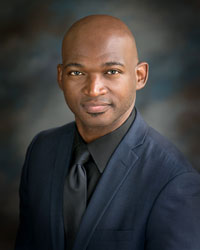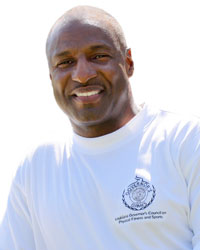NEWS
New Frontiers to focus on health disparities in Feb. 1 lecture
At 3:30 p.m. CST Feb. 1, The New Frontiers in Biomedical Research Seminar series will return for the second of two lectures focused on patient care. This lecture will focus on COVID-19, health care disparities, vaccine education, and what individuals can do to aid in community response and recovery. The presentation will be led by Dr. Karriem S. Watson from the University of Illinois, Chicago School of Public Health Community Health Sciences and Durand “Rudy” Macklin from the Louisiana Department of Health.

Dr. Karriem S. Watson
Watson is a Community Health Scientist who serves as the Associate Executive Director of the Mile Square Health Center, a group of federally qualified health clinics (FQHCs) affiliated with the University of Illinois Hospital and Health Sciences System. He also serves as the Associate Director of Community Outreach and Engagement for the University of Illinois Cancer Center at UIC (UI Cancer Center) and has a faculty appointment in the UIC School of Public Health as Research Assistant Professor. His research is focused on cancer prevention and control and mitigating the impact of social determinants of health on chronic conditions such as diabetes and hypertension
“Dr. Watson’s research and publications are deeply rooted in community engagement and health equity and expanding diversity in clinical trials,” said Dr. Jamie Newman, co-founder of the New Frontiers series. “He has a National Cancer Institute (NCI) grant to address breast cancer disparities among African-American women and leads the outreach and engagement core of the NCI U54 Chicago Cancer Health Equity Collaborative where he is also leading a research project on engaging African-American men as Citizen Scientists to improve lung cancer outcomes.”
Watson serves as Board Chair of Community Campus Partnerships for Health and on the Diversity and Inclusion Task Force for the UI Health Department of Medicine. In addition to his passion for health equity, he shares a passion for mentoring and engaging youth underrepresented in science and biomedical research. Watson’s contributions earned him recognition by the Chicago Urban League as an “Innovator in STEM.”
Macklin currently serves as Director of the Bureau of Minority Health Access for the Louisiana Department of Health and is the Director of the Governor’s Fitness Council. He is well known for his success as a member of the 1980-81 LSU Basketball team where he was an all-time leading rebounder and second-all-time leading scorer.

Rudy Macklin
Macklin later went on to play professional basketball before returning to his home state of Louisiana where he now works to improve the overall health and well-being of those who live here. For the past 28 years, he has served as an adviser to the Louisiana Department of Health and the Legislature on health policy issues affecting health status and access among underserved immigrants, refugees and various racial/ethnic populations. Macklin was appointed by Gov. Edwin Edwards to serve as director of the Louisiana Governor’s Council on Physical Fitness and Sports (1992) and was later hand-picked to establish the state’s first minority health office under Gov. Mike Foster called the Louisiana Bureau of Minority Health Access and Promotions (1996) to minimize health disparities among underserved racial and ethnic populations in the state through collaboration, advocacy, and education, and to promote culturally competent programs aimed at improving access to health care services.
Macklin also served as director of staff for the Louisiana Minority Health Affairs Commission and the Louisiana Health Disparities Commission both established by the Louisiana Legislature. In 1997, he published Louisiana’s first report on health disparities called “From Disparity to Parity.” Macklin continued to be active in addressing health disparities and in 2005, following Hurricane Katrina, he organized and coordinated “Operation Safe Re-entry” to determine the health status of minority communities, facilitate preventive and post care through support victims devastated by natural disasters.
Macklin co-founded the “Community Preparedness Response Network” (CPRN) in partnership with the Chahta Native American Tribe that is designed to assist low-income communities with establishing their own community emergency preparedness plan in the event of a natural disaster or pandemic flu outbreak. The CPRN provides hard-to-reach populations a point of contact during natural disasters or pan flu outbreak and make available resources to assist them with relief and recovery efforts specific for their communities.
Watson will begin the seminar with a presentation on healthcare disparities that have been highlighted because of COVID-19 and share his experience as a community health specialist in Chicago during the pandemic. Macklin will follow with a presentation on Louisiana’s efforts to address healthcare disparities during not only the pandemic but also natural disaster recovery. Macklin will also share what has been learned about these recoveries and what everyone can do to help.
Discussion will be moderated by series organizers Dr. Mary Caldorera-Moore and Newman, along with Devonia Love-Vaughn, Dean of Inclusion Initiatives and Student Success; Dr. Jeremy Mhire, Associate Professor, School of History and Social Science; and special alumni guest Dr. John H. Stewart, IV, MD, MBA, Physician Executive for Oncology Services for the University of Illinois Health System.
“As we continue to navigate the on-going pandemic and prepare for the lasting impacts this will have it is important that we engage in an active discussion so that moving forward we take action to improve conditions, healthcare, and communication,” Caldorera-Moore said. “Each of these moderators bring a different perspective and encourage a focus on community health for the university and general public that will begin that critical conversation.”
Events are open to the general public, and registration is required. For more information on this and other events, visit community.latech.edu.
Recent Comments